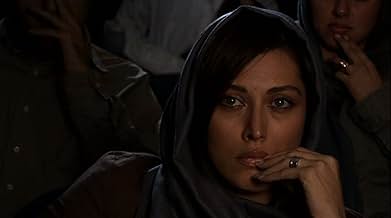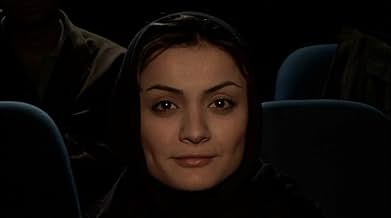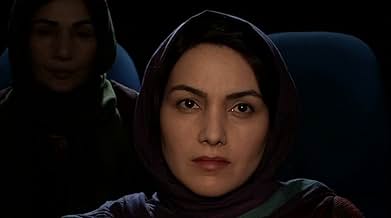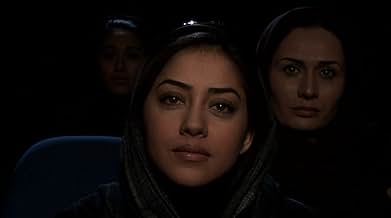VALUTAZIONE IMDb
6,7/10
2976
LA TUA VALUTAZIONE
Aggiungi una trama nella tua linguaWomen's expressions are captured as they watch Khosrow and Shirin, a 12th-century Persian play staged by Kiarostami, revealing their reactions to the unseen narrative.Women's expressions are captured as they watch Khosrow and Shirin, a 12th-century Persian play staged by Kiarostami, revealing their reactions to the unseen narrative.Women's expressions are captured as they watch Khosrow and Shirin, a 12th-century Persian play staged by Kiarostami, revealing their reactions to the unseen narrative.
- Premi
- 1 candidatura in totale
Zar Amir Ebrahimi
- Woman in audience
- (as a different name)
Vishka Assayesh
- Woman in audience
- (as Vishka Asayesh)
Recensioni in evidenza
The background story is an ancient Persian tragic romance that involves the Queen to be of Armenia, Shirin and the King of (neo)-Persia Khosrow. However, this is not the story we see. The movie is filmed in a theater and we see the faces of women watching the romance unfold on screen.
A very interesting outlook on cinema, narratives and emotions altogether, if one thing for sure it is that Shirin is not your typical movie and you are most likely going to be quite surprised by it. Although all of the audience are part of the Iranian cinema industry (with the exception of the renowned French actress Juliette Binoche), there is no particular focus on anyone and the film seems to jump from face to face in accordance to the emotions depicted.
It is quite interesting to see the differences, for example when someone cries during a scene, others might bite their finger or play with their hair. It reflects back at the spectator who might at the time do the exact same and a certain bond can or can not be formed. There are all sorts of reactions, the shock, the fear are both displayed and experienced differently. Some will, for example in a scene which most likely involves a battle, close their eyes, put their hand on their forehead or become very still. In addition to the biting fingers, some women also readjust their hijab and leaving us wondering if and why watching those scenes disturbs them so.
There were men in the audience and one could wonder why no shots focused on them. I wondered about this myself and it puzzled me, though perhaps it may be that the story being told is a warning to women about love. Also, the title is Shirin, not Shirin and Khosrow, which I guess would imply that the focus is on the part of the woman in the tragedy.
I have to admit that I would probably have enjoyed seeing the film that was being shown more than the expressions of the audience. Of course, it was quite an experience and an exposure to a vast palette of emotions, but I feel emotions are such a personal thing that they might be better enjoyed at the first degree, when they are still raw. I can easily assume that this would be very different from a viewer to another and one can relate more to faces describing an emotion than a situation.
I liked: A different outlook on movies. Womanly, in a way, as I wouldn't quite call it a feminist film. Background historical tale.
I disliked : Feels a little like watching a recycled movie at times, digested by others. Really puzzling at times it is quite impossible to understand what goes on on the screen, maybe it is intended that way, but it did bother me.
64/100 A very particular film, it felt like going to a theatrical performance of an old Greek tragedy and standing on the scene watching others watch it unfold. It feels really artsy.
A very interesting outlook on cinema, narratives and emotions altogether, if one thing for sure it is that Shirin is not your typical movie and you are most likely going to be quite surprised by it. Although all of the audience are part of the Iranian cinema industry (with the exception of the renowned French actress Juliette Binoche), there is no particular focus on anyone and the film seems to jump from face to face in accordance to the emotions depicted.
It is quite interesting to see the differences, for example when someone cries during a scene, others might bite their finger or play with their hair. It reflects back at the spectator who might at the time do the exact same and a certain bond can or can not be formed. There are all sorts of reactions, the shock, the fear are both displayed and experienced differently. Some will, for example in a scene which most likely involves a battle, close their eyes, put their hand on their forehead or become very still. In addition to the biting fingers, some women also readjust their hijab and leaving us wondering if and why watching those scenes disturbs them so.
There were men in the audience and one could wonder why no shots focused on them. I wondered about this myself and it puzzled me, though perhaps it may be that the story being told is a warning to women about love. Also, the title is Shirin, not Shirin and Khosrow, which I guess would imply that the focus is on the part of the woman in the tragedy.
I have to admit that I would probably have enjoyed seeing the film that was being shown more than the expressions of the audience. Of course, it was quite an experience and an exposure to a vast palette of emotions, but I feel emotions are such a personal thing that they might be better enjoyed at the first degree, when they are still raw. I can easily assume that this would be very different from a viewer to another and one can relate more to faces describing an emotion than a situation.
I liked: A different outlook on movies. Womanly, in a way, as I wouldn't quite call it a feminist film. Background historical tale.
I disliked : Feels a little like watching a recycled movie at times, digested by others. Really puzzling at times it is quite impossible to understand what goes on on the screen, maybe it is intended that way, but it did bother me.
64/100 A very particular film, it felt like going to a theatrical performance of an old Greek tragedy and standing on the scene watching others watch it unfold. It feels really artsy.
This is only my second Kiarotami film, the first was Certified Copy, 20 minutes into that I was going to give up, mainly because HE the character infuriated me beyond belief. I stayed with it and was soon after totally immersed. Approaching this film, I now was forewarned that I would be asked to think and reflect, to that end I had not read any prior comments. The set up is easy to understand; a room full of actresses watching a well known play, but that is the premise only, at least I could be aware that it could not possibly be happening in real time and this was a performance of a performance, the reactions are staged as much as the play we do not see. Where does its meaning reside I do not really know nor want to know, you can give it a feminist meaning, a political meaning and aesthetic meaning and surely it is all of these and perhaps more or perhaps less, Asking for meaning almost always diminishes true art
Shirin (2008) is an Iranian film directed by Abbas Kiarostami. It's truly unique.
We watch an audience of women who are watching a movie about Khosrow and Shirin. That's the title of a famous tragic romance by the Persian poet Nizami Ganjavi (1141-1209). It's a famous poem in Iran. (There's a whole world out there of things that I don't know.)
In any case, the women are watching a movie. We can hear the music, the sound effects, and the dialog. But we never see the movie!
What we see are women's reactions to what they are seeing on the screen. When I looked into it, it turns out that Kiarostami filmed over 100 women. All of them were famous Iranian actors or other cinema professionals.
For example, one of the women was Leila Hatami, who later starred in the film A Separation (2011). I believe all of the women were Iranian except for one. She's a famous French actor who had worked with Kiarostami in 2010. If you watch carefully, you'll recognize her.
This movie has an anemic IMDb rating of 6.7. (I guess that you either buy into the concept, or you don't.) I thought it was much better than that, and rated it 8.
P.S. We viewed this film on a Cinema Guild DVD. It came with several extras, one of which is worth seeing--Taste of Shirin (2008).
We watch an audience of women who are watching a movie about Khosrow and Shirin. That's the title of a famous tragic romance by the Persian poet Nizami Ganjavi (1141-1209). It's a famous poem in Iran. (There's a whole world out there of things that I don't know.)
In any case, the women are watching a movie. We can hear the music, the sound effects, and the dialog. But we never see the movie!
What we see are women's reactions to what they are seeing on the screen. When I looked into it, it turns out that Kiarostami filmed over 100 women. All of them were famous Iranian actors or other cinema professionals.
For example, one of the women was Leila Hatami, who later starred in the film A Separation (2011). I believe all of the women were Iranian except for one. She's a famous French actor who had worked with Kiarostami in 2010. If you watch carefully, you'll recognize her.
This movie has an anemic IMDb rating of 6.7. (I guess that you either buy into the concept, or you don't.) I thought it was much better than that, and rated it 8.
P.S. We viewed this film on a Cinema Guild DVD. It came with several extras, one of which is worth seeing--Taste of Shirin (2008).
It's like reading the book of this mythological tale of Khosrow and Shirin's love from the expressions on the faces of the women watching the movie instead of plainly watching the movie itself.
So creative, so extraordinary, so poetic, so emotional, so fantastic...
Just as a note, there is a different but partly similar version of this old tale told in Turkey for ages known as "Ferhat and Sirin" in that Ferhat is stipulated to dig long channels and tunnels on the rocky mountains to bring water to the palace of the sultan as a precondition to marry with his doughter Sirin. Remains of some channels and tunnels in the city of Amasya is shown as a proof of this mythological love.
So creative, so extraordinary, so poetic, so emotional, so fantastic...
Just as a note, there is a different but partly similar version of this old tale told in Turkey for ages known as "Ferhat and Sirin" in that Ferhat is stipulated to dig long channels and tunnels on the rocky mountains to bring water to the palace of the sultan as a precondition to marry with his doughter Sirin. Remains of some channels and tunnels in the city of Amasya is shown as a proof of this mythological love.
"Shirin" has not been released on DVD in Brazil and I was lured by the IMDb User Rating (7.0/10 with 464 votes) and three favorable reviews (one guy with 4 reviews, another with 6 reviews and one with 952 reviews) published by IMDb. Conclusion: I bought the imported DVD released by Cinema Gould distributor, with subtitles in English.
Unfortunately I was not able to see more than fifteen minutes of this annoying and pretentious recitation of a Persian poem showing the faces of Iranian women in the audience of a movie theater while they watch on the screen. Then I took a nap and I was not brave enough to rewind the film.
"Shirin" might be an interesting short, but NEVER a feature. Fans of Abbas Kiarostami may like "Shirin", but that is not my case; actually I hated it, since it gave me the sensation of being backwards to the screen snooping the audience. Probably Godard might be jealous for not thinking of such boring experimental cinema before. My vote is one (awful).
Title (Brazil): Not Available
Unfortunately I was not able to see more than fifteen minutes of this annoying and pretentious recitation of a Persian poem showing the faces of Iranian women in the audience of a movie theater while they watch on the screen. Then I took a nap and I was not brave enough to rewind the film.
"Shirin" might be an interesting short, but NEVER a feature. Fans of Abbas Kiarostami may like "Shirin", but that is not my case; actually I hated it, since it gave me the sensation of being backwards to the screen snooping the audience. Probably Godard might be jealous for not thinking of such boring experimental cinema before. My vote is one (awful).
Title (Brazil): Not Available
Lo sapevi?
- QuizAccording to some reports, the women were filmed individually in Kiarostami's living room, with the director asking them to cast their gaze at a mere series of dots above the camera.
- ConnessioniReferenced in Taste of Shirin (2008)
I più visti
Accedi per valutare e creare un elenco di titoli salvati per ottenere consigli personalizzati
- How long is Shirin?Powered by Alexa
Dettagli
Botteghino
- Lordo in tutto il mondo
- 26.302 USD
- Tempo di esecuzione
- 1h 32min(92 min)
- Colore
- Mix di suoni
- Proporzioni
- 1.85 : 1
Contribuisci a questa pagina
Suggerisci una modifica o aggiungi i contenuti mancanti























